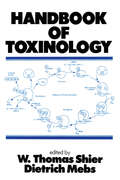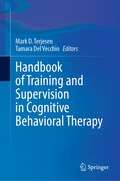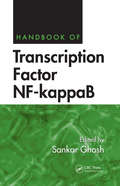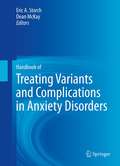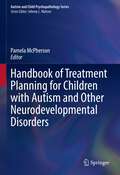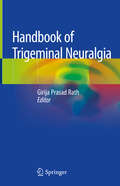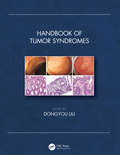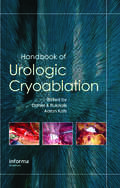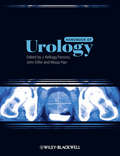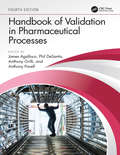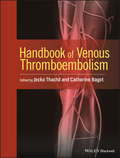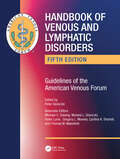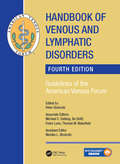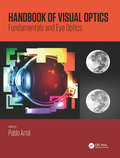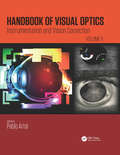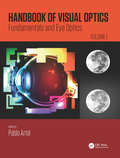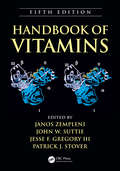- Table View
- List View
Handbook of Toxicology
by Michael J. Derelanko Carol S. AulettaThe Handbook of Toxicology, Third Edition provides an updated practical reference source for practicing toxicologists in the pharmaceutical and chemical industries, contract laboratories, regulatory agencies, and academia. Written by experts in their specific toxicology fields, the chapters provide both fundamental and applied information. Topics r
Handbook of Toxinology
by W. Thomas Shier and Dietrich MebsOrganized primarily around the mechanisms of action of the toxins at the biochemical, physiological and pathological level, rather than by source, the handbook covers most toxins which have been clearly identified and characterized, but emphasizes toxins that are more important by virtue of the sign
Handbook of Training and Supervision in Cognitive Behavioral Therapy
by Mark D. Terjesen Tamara Del VecchioThis book provides a scientific and practical guide for training and supervision in cognitive behavioral therapy (CBT). It builds on more general fundamentals of clinical supervision with a theory-driven approach backed by empirical support for training and supervising clinicians in the practice of CBT. The book dispels the myth of “do it, teach it” as it relates to supervision and addresses the importance of recognizing that one size does not fit all with CBT supervision. The volume synthesizes CBT research on supervision and links it to the practice of supervision. It reviews components of supervision that warrant consideration (e.g., therapeutic alliance, ethics), specific settings (e.g., medical setting, schools) and clients (e.g., culture, individual, group, disability, and high-risk). In addition, it addresses a neglected area of developing competency, including developmental models as well as measuring trainee and supervisor competency in the provision of clinical supervision. The book recommends future directions on how to integrate technology into supervision to enhance the quality of supervision and, ultimately, client outcome. Key areas of coverage include: Major constructs in CBT supervision and training.Supervising work with various clients, including individuals, children, adolescents, families, and couples.Supervision and high-risk cases.Teaching and supervision within a behavioral medicine context.Issues of diversity, technology, and ethics of supervision.The Handbook of Training and Supervision in Cognitive Behavioral Therapy is an essential resource for researchers, professors, and graduate students as well as clinicians, therapists, and other professionals in clinical and school psychology, pediatrics, social work, developmental psychology, behavioral therapy/rehabilitation, child and adolescent psychiatry, nursing, and special education.
Handbook of Transcription Factor NF-kappaB
by Sankar GhoshRecent evidence proving the molecular link between unchecked, chronic inflammation and cancer has implicated the transcription factor NF-kB as a key factor in both inhibiting apoptosis and promoting cell proliferation. Since its initial identification 20 years ago as a simple regulating factor in one small part of the immune response, NF-kB is prov
Handbook of Treating Variants and Complications in Anxiety Disorders
by Dean Mckay Eric A. StorchAs prevalent as anxiety is as a diagnosis, clinically complex cases are even more so. At the same time that it is recognized as a spectrum of disorders with many possibilities for intervention, it is most often seen with variations that further complicate treatment. The Handbook of Treating Variants and Complications in Anxiety Disorders explains in clear detail how and why clinical factors present challenges to clinicians treating clients with these disorders. Comorbid conditions often found in children, adolescents, and adults with anxiety, including developmental disabilities and personality disorders, are analyzed in the context of treatment. Case examples and literature reviews illustrate the relative merits of integrated versus sequential treatment, the importance of prioritizing behaviors, age-related considerations, and therapist issues. This best-practices approach guides readers in choosing current evidence-based options for treatment that is tailored to the individual and effective in the short and long term. Included in the Handbook: Prognostic indicators of treatment response for children and adults with anxiety disorders.Treatment of comorbid anxiety and disruptive behavior in youth.Treatment of PTSD with comorbid borderline personality disorder.Limited motivation, patient-therapist mismatch, and the therapeutic alliance.Assessment and treatment of comorbid anorexia nervosa and obsessive compulsive disorder.Treatment of comorbid anxiety disorders across the lifespan. Developed as a companion reference to the Handbook of Assessing Variants and Complications in Anxiety Disorders, the Handbook of Treating Variants and Complications in Anxiety Disorders is of immediate relevance to researchers, scientist-practitioners, and graduate students in clinical child, school, and developmental psychology; social work; psychiatry; psychotherapy; counseling; and pediatrics.
Handbook of Treatment Planning for Children with Autism and Other Neurodevelopmental Disorders (Autism and Child Psychopathology Series)
by Pamela McPhersonThis handbook addresses treatment planning for children with autism spectrum disorder (ASD) and other neurodevelopmental disabilities (NDDs) using a medical home perspective. It examines the medical home model, which has been promoted as the standard of care by the American Academy of Pediatrics since 2002, emphasizing collaboration between patients, families, and providers to optimize care. The handbook addresses treatment planning, including the coordination of the care provided by multiple specialists with a clear, shared vision for maximizing each child’s potential.Key areas of coverage include:· Elements of treatment planning, history of the medical home model, documentation, and strategies to facilitate communication.· Goals of treatment from the perspectives of the family, person served, care providers, and fiscal and regulatory bodies.· Role of each specialist, highlighting the most common conditions experienced by children with ASD and other NDD with expectations for assessment and treatment.· Detailed recommendations for making referrals and assisting the child and family in preparing for appointments.The Handbook of Treatment Planning for Children with Autism Spectrum Disorder and Other Neurodevelopmental Disabilities is a must-have resource for researchers, professors, and graduate students as well as clinicians, therapists, and other professionals across such interrelated disciplines as clinical child, school, and developmental psychology, child and adolescent psychiatry, social work, rehabilitation medicine/therapy, pediatrics, and special education.
Handbook of Trigeminal Neuralgia
by Girija Prasad RathThis book covers all aspects of trigeminal neuralgia (TGN) which is a common yet very painful condition of face and scalp. Chapters include historical perspective of the condition, clinical presentations, diagnosis, management strategy, drug therapy, different interventional techniques utilized, and non-invasive modalities offered. The book has ample images to explain three main percutaneous procedures carried out for this condition such as radiofrequency thermocoagulation, glycerol rhizolysis and balloon microcompression in detail. It also covers open neurosurgical procedures including microvascular decompression and certain non-conventional and non-invasive methods. This book provides assistance to pain physicians to have a comprehensive knowledge of trigeminal neuralgia. It is also relevant to neurosurgeons, neurologists, anesthesiologists, dental surgeons and resident doctors.
Handbook of Tumor Syndromes
by Dongyou LiuTumors/cancers are characterized by uncontrolled growths of abnormal cells that extend beyond their usual boundaries and disrupt the normal functions of affected organs and systems. While about 75%–80% of tumors/cancers arise sporadically without a family connection, 20%–25% appear to be familial (including 10%–15% nonhereditary familial tumors [or familial tumors] and 5%–10% hereditary familial tumors [or hereditary tumors]). As nonhereditary and hereditary familial tumors often show both tumor-related and non-tumor-related (or syndromic) symptoms, they are referred to as tumor syndromes (or cancer susceptibility syndromes). In comparison with sporadic tumors/cancers, tumor syndromes (>300 described so far) tend to occur at a younger age, involve multiple organs and systems, produce multiple (often in a distinct spectrum) and bilateral lesions, form multiple hamartomatous, benign, or precursor lesions; locate in specific site(s), display unique syndromic features, and affect multiple members/generations of a family. This book provides state-of-art and authoritative coverage of nearly 100 tumor syndromes, with chapters presenting overviews of individual tumor syndromes in relation to their biology, epidemiology, pathogenesis, clinical features, diagnosis, treatment, and prognosis. Featuring contributions from oncologists, clinicians, and specialists, the book offers a reliable, comprehensive reference on tumor syndromes for scholars and students of medicine, dentistry, pharmacology, nursing, public health, and other biomedical disciplines. Key Features Reviews the biology, epidemiology, pathogenesis, and clinical features of tumor syndromes Contains up-to-date information on the diagnosis and treatment of tumor syndromes Includes expert coverage from leading oncologists and clinicians Related Titles J. R. McIntosh, Understanding Cancer: An Introduction to the Biology, Medicine, and Societal Implications of This Disease (ISBN 978-0-8153-4535-0) P. S. T. Shanmugam, Understanding Cancer Therapies (ISBN 978-1-1381-9815-9) J. M. Baehring and J. M. Piepmeier, eds., Brain Tumors: Practical Guide to Diagnosis and Treatment (ISBN 978-0-3673-9022-8) D. Liu, Tumors and Cancers: Endocrine Glands – Blood – Marrow – Lymph (ISBN 978-1-4987-2975-8) Dongyou Liu, PhD, has worked at several research and clinical laboratories in Australia and the United States for the past three decades, with a focus on molecular characterization of microbial pathogens and detection of human genetic disorders and tumors/cancers. He is the primary author of more than 50 original research and review articles in various peer-reviewed international journals, the contributor of 197 book chapters, and the editor of more than 10 books.
Handbook of Upper Extremity Examination: A Practical Guide
by Roger PillemerIn addition to complementary radiographic imaging, the physical exam is an essential diagnostic element for the orthopedic surgeon. As such, learning to perform this exam thoroughly is of utmost importance to medical students, residents and interns on an orthopedic rotation and in later practice. This practical text succinctly presents all of the necessary information regarding the physical examination of the upper extremity. The hand, wrist, elbow and shoulder are discussed in dedicated thematic sections, with each section comprised of three main chapters. The initial chapter describes the musculoskeletal anatomy and function of the joint, presenting the tests themselves along with the rationale for performing them. The second chapter presents the systematic examinations carried out in every case, and the third chapter describes examinations for specific conditions relating to the joint, including tendinopathies, osteoarthritis, neurological conditions, deformities, and more. Plentiful bullet points and color images throughout the text describe and illustrate each test and physical sign.Convenient and user-friendly, Handbook of Upper Extremity Examination is a valuable, portable guide to this all-important diagnostic tool for students and practitioners alike.
Handbook of Urologic Cryoablation
by Aaron Katz Daniel B. RukstalisAs prostate cancer is the most common type of cancer found in men, the clinical and surgical commitments to treating it are enormous, as well as to be expected given the aging male population. Urologic cryotherapy is one such method for those with organ-confined or minimally-spread prostate cancer. The benefits it offers both patient and surgeon ar
Handbook of Urology
by John B. Eifler Misop Han J. Kellogg ParsonsAre you a urologist, trainee, or medical student managing patients with conditions like BPH, urinary stones or priapism? Do you require a rapid-reference guide to clinical management? If so, this full colour, practical handbook is the ideal resource, providing rapid-access information on the clinical management of all major urologic disorders and problems likely to be encountered daily. With a strong emphasis on user-friendliness and point-of-care accessibility, sections are divided according to the major areas of urology, with each chapter containing the following features: • case histories • multiple choice questions • key points box • key weblinks box • common errors in diagnosis/treatment boxes An experienced contributor team outlines the skills required to provide appropriate assessment and management of patients; in particular identifying the correct diagnostic and management options for each disorder, and how to perform basic urological procedures safely and effectively. Information corresponds to relevant American Urological Association (AUA) and European Association of Urology (EAU) guidelines for clinical management. Perfect for quick browsing prior to performing a consultation, preparing for ward rounds, or when brushing up for the Boards, Handbook of Urology is the ideal quick-stop manual for urologists of all levels involved in day to day management of patients.
Handbook of Urology
by John Kellogg Parsons John B. Eifler Misop HanAre you a urologist, trainee, or medical student managing patients with conditions like BPH, urinary stones or priapism? Do you require a rapid-reference guide to clinical management?If so, this full colour, practical handbook is the ideal resource, providing rapid-access information on the clinical management of all major urologic disorders and problems likely to be encountered daily. With a strong emphasis on user-friendliness and point-of-care accessibility, sections are divided according to the major areas of urology, with each chapter containing the following features:* case histories* multiple choice questions* key points box* key weblinks box* common errors in diagnosis/treatment boxesAn experienced contributor team outlines the skills required to provide appropriate assessment and management of patients; in particular identifying the correct diagnostic and management options for each disorder, and how to perform basic urological procedures safely and effectively. Information corresponds to relevant American Urological Association (AUA) and European Association of Urology (EAU) guidelines for clinical management. Perfect for quick browsing prior to performing a consultation, preparing for ward rounds, or when brushing up for the Boards, Handbook of Urology is the ideal quick-stop manual for urologists of all levels involved in day to day management of patients.
Handbook of Validation in Pharmaceutical Processes, Fourth Edition
by James Agalloco Phil DeSantis Anthony Grilli Anthony PavellRevised to reflect significant advances in pharmaceutical production and regulatory expectations, Handbook of Validation in Pharmaceutical Processes, Fourth Edition examines and blueprints every step of the validation process needed to remain compliant and competitive. This book blends the use of theoretical knowledge with recent technological advancements to achieve applied practical solutions. As the industry's leading source for validation of sterile pharmaceutical processes for more than 10 years, this greatly expanded work is a comprehensive analysis of all the fundamental elements of pharmaceutical and bio-pharmaceutical production processes. Handbook of Validation in Pharmaceutical Processes, Fourth Edition is essential for all global health care manufacturers and pharmaceutical industry professionals. Key Features: Provides an in-depth discussion of recent advances in sterilization Identifies obstacles that may be encountered at any stage of the validation program, and suggests the newest and most advanced solutions Explores distinctive and specific process steps, and identifies critical process control points to reach acceptable results New chapters include disposable systems, combination products, nano-technology, rapid microbial methods, contamination control in non-sterile products, liquid chemical sterilization, and medical device manufacture
Handbook of Venoms and Toxins of Reptiles
by Stephen P. MackessyA decade after publication of the first edition, Handbook of Venoms and Toxins of Reptiles responds to extensive changes in the field of toxinology to endure as the most comprehensive review of reptile venoms on the market. The six sections of this new edition, which has nearly doubled in size, complement the original handbook by presenting current information from many of the leading researchers and physicians in toxinology, with topics ranging from functional morphology, evolution and ecology to crystallography, -omics technologies, drug discovery and more. With the recent recognition by the World Health Organization of snakebite as a neglected tropical disease, the section on snakebite has been expanded and includes several chapters dealing with the problem broadly and with new technologies and the promises these new approaches may hold to counter the deleterious effects of envenomation. This greatly expanded handbook offers a unique resource for biologists, biochemists, toxicologists, physicians, clinicians, and epidemiologists, as well as informed laypersons interested in the biology of venomous reptiles, the biochemistry and molecular biology of venoms, and the effects and treatment of human envenomation.
Handbook of Venous Thromboembolism
by Jecko Thachil Catherine BagotA clinically oriented handbook providing up-to-date recommendations for mastering the practical aspects of patient management for venous thromboembolism Venous thromboembolism (VTE) is associated with high morbidity and mortality both in and out of the hospital setting, and is one of the commonest reasons for hospital attendances and admissions. Designed as a practical resource, the Handbook of Venous Thromboembolism covers the practical aspects of venous thromboembolism management in short and easily followed algorithms and tables. This important text helps physicians keep up-to-date with the latest recommendations for treating venous thromboembolism in clinic-oriented settings. Experts in fields such as the radiological diagnosis of pulmonary embolism and thrombophilia testing, give a succinct summary of the investigation, diagnosis and treatment of venous thromboembolism and include evidence-based guidelines. With contributions from a team on internationally recognized experts, Handbook of Venous Thromboembolism is a source of information that specialists in the field can recommend to non-specialists and which the latter will be able to review to assist in their education and management of this wide-spread condition. This vital resource: • Comprises of a clinically focused handbook, useful as a daily resource for the busy physician • Offers a handbook written by an international team of specialists offering their experience on the practical aspects of venous thromboembolism management • Addresses venous thrombosis prevention, a major focus for healthcare providers • Includes coverage on controversies in the management of venous thromboembolism so clinicians can understand how experts are practicing in real scenarios Written for hematology trainees, emergency and acute medicine physicians, junior doctors, and primary care physicians, Handbook of Venous Thromboembolism covers the basics for treating patients with venous thromboembolism and offers guidelines from noted experts in the field.
Handbook of Venous and Lymphatic Disorders: Guidelines of the American Venous Forum
by Peter Gloviczki Michael C. Dalsing Monika L. Gloviczki Fedor Lurie Gregory L. Moneta Cynthia K. Shortell Thomas W. WakefieldRenowned as the essential reference for all venous specialists, phlebologists, vascular surgeons, and vascular medicine physicians, the fifth edition of the Handbook of Venous and Lymphatic Disorders: Guidelines of the American Venous Forum covers the investigation, prevention, evaluation, and treatment of venous and lymphatic disorders.The full spectrum of acute and chronic venous disorders, chronic lymphedema and chylous complications are included. New or entirely revised chapters discuss in detail basic considerations, diagnostic evaluation, management of acute venous thrombosis, and chronic venous disorders, including deep venous disease and venous ulcers. Medical treatments, including compression therapy, veno-active compounds, and new oral antithrombotic medications, are discussed. Minimally invasive endovascular techniques to treat deep vein thrombosis and pulmonary embolism with catheter-directed thrombolysis, pharmaco-mechanical, mechanical thrombectomy, and venous stenting are presented.Few areas in medicine have progressed as fast as minimally invasive outpatient treatment of chronic venous disease. Endovenous therapies include laser and radiofrequency ablation, liquid and foam sclerotherapy, minimally invasive surgery, cyanoacrylate embolization, mechanico-chemical or ultrasonic ablations, among others.Written by the world’s foremost venous experts, leaders of the American Venous Forum, and international authorities, the Handbook has become the most important reference for both day-to-day management and investigation of venous and lymphatic disorders.
Handbook of Venous and Lymphatic Disorders: Guidelines of the American Venous Forum, Fourth Edition
by Peter Gloviczki American Venous ForumThe Handbook of Venous Disorders, first published in 1996, is a handbook for all clinicians and surgeons who are involved with the investigation, evaluation, or management of venous and lymphatic diseases or malformations. These disorders include varicose veins, venous ulcers, DVT, lymphedema, and pulmonary embolism, as well as damage to the veins through trauma or tumor growth. The new edition has been completely updated to bring the book in line with current teaching practices.
Handbook of Veterinary Communication Skills
by Carol Gray Jenny MoffettThis is the first definitive textbook on veterinary communication, written specifically for students and veterinary professionals by a group of international experts. Communication is a core clinical skill, and is now taught as a compulsory part of most veterinary degree courses. Good communication is crucial to the veterinarian-client-patient relationship, to patient health and ultimately to the success of any veterinary business.The book covers all the key areas of communication including: the basic framework for the veterinary consultation; professional, ethical and legal aspects; communication with clients and colleagues; and coping with end-of-life and other difficult situations. It combines the most up-to-date research with a wealth of practical information, such as:Real-life case studies to help you apply your learning to real scenariosSimple step-by-step guidelines showing you how to deal with specific situationsExamples of written resources you can use in practiceThis valuable textbook has been written and edited by a carefully chosen group of specialists, comprising veterinary communication lecturers, veterinary practitioners, training managers and counsellors.
Handbook of Veterinary Nursing
by Hilary Orpet Perdi WelshHandbook of Veterinary Nursing presents essential guidance and helpful tips on developing and delivering high quality nursing care and skills. Fully updated, this easy-to-follow guide reflects recent changes to veterinary nursing qualifications, current terminology and drugs in use. The emphasis is on the importance of working methodically, using high quality procedures, to help the whole veterinary team ensure the most successful outcomes in animal care. Written in note form for quick reference by veterinary nurses and technicians at all stages of their training and career, this will be invaluable for both exam revision and quick reference in clinic. Contents include: The nursing process in veterinary care, physical assessment of the patient, managing the hospital environment, managing the operating room, surgical nursing activities, anaesthesia, diagnostic imaging, diagnostic tests, triage and emergency procedures, and essential calculations for drugs, fluids, nutrition and radiographic exposures. Key features: •Gives clinical advice quickly and simply •Written by authors with many years experience of veterinary nurse training and education •Contains essential calculations •Illustrated in colour throughout
Handbook of Veterinary Pharmacology
by Walter H. HsuHandbook of Veterinary Pharmacology is a clear and concise guide to pharmacology concepts and commonly used veterinary drugs. Providing a succinct overview of veterinary pharmacology, this book presents information in a user-friendly outline format to allow quick access to practical drug information. With chapters covering the basic principles, specific drugs, interactions, and legal considerations, Handbook of Veterinary Pharmacology offers up-to-date information on basic and clinical veterinary pharmacology.As an aid to student comprehension, simple line drawings depict the mechanisms of action and study questions with explanations are included at the end of each chapter. Appendices on withdrawal times for drugs in production animals and drug dosages in domestic species are a valuable tool, allowing quick decisions on drug therapy. Handbook of Veterinary Pharmacology is an indispensable text for veterinary students and practitioners.
Handbook of Viral and Rickettsial Hemorrhagic Fevers (Routledge Revivals)
by James H. S. GearFirst Published in 1988: There clearly is a need for a comprehensive account of the hemorrhagic fever viruses and the diseases they cause, as well as of the conditions which may simulate them. There is also a need for an account of the methods for their study and prevention. It is trusted that this handbook will help meet this need.
Handbook of Visual Optics, Two-Volume Set
by Pablo ArtalHandbook of Visual Optics offers an authoritative overview of encyclopedic knowledge in the field of physiological optics. It builds from fundamental concepts to the science and technology of instruments and practical procedures of vision correction, integrating expert knowledge from physics, medicine, biology, psychology, and engineering. The chapters comprehensively cover all aspects of modern study and practice, from optical principles and optics of the eye and retina to novel ophthalmic tools for imaging and visual testing, devices and techniques for visual correction, and the relationship between ocular optics and visual perception.
Handbook of Visual Optics, Volume Two: Instrumentation and Vision Correction
by Pablo ArtalHandbook of Visual Optics offers an authoritative overview of encyclopedic knowledge in the field of physiological optics. It builds from fundamental concepts to the science and technology of instruments and practical procedures of vision correction, integrating expert knowledge from physics, medicine, biology, psychology, and engineering. The chapters comprehensively cover all aspects of modern study and practice, from optical principles and optics of the eye and retina to novel ophthalmic tools for imaging and visual testing, devices and techniques for visual correction, and the relationship between ocular optics and visual perception.
Handbook of Visual Optics: Fundamentals and Eye Optics, Volume One
by Pablo ArtalHandbook of Visual Optics offers an authoritative overview of encyclopedic knowledge in the field of physiological optics. It builds from fundamental concepts to the science and technology of instruments and practical procedures of vision correction, integrating expert knowledge from physics, medicine, biology, psychology, and engineering. The chapters comprehensively cover all aspects of modern study and practice, from optical principles and optics of the eye and retina to novel ophthalmic tools for imaging and visual testing, devices and techniques for visual correction, and the relationship between ocular optics and visual perception.
Handbook of Vitamins
by Patrick J. Stover Janos Zempleni John W. Suttie Jesse F. Gregory IIIWithin the last few years, knowledge about vitamins has increased dramatically, resulting in improved understanding of human requirements for many vitamins. This new edition of a bestseller presents comprehensive summaries that analyze the chemical, physiological, and nutritional relationships, as well as highlight newly identified functions, for a

